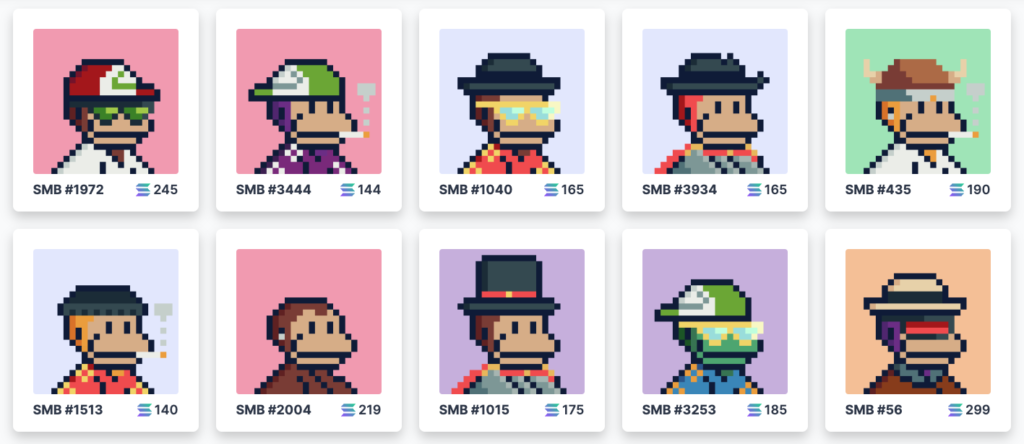
Our objective with this article is to determine how many wallets have decided to delegate their staked Solana to the MonkeDAO validator since February 1st. We will create a visualization of delegations per day per wallet.
MonkeDAO was the first NFT DAO on Solana, and also the first NFT DAO to establish a validator in order to contribute to decentralizing and securing the network. Users can choose which validators to support when staked Solana. Let’s discuss this in more detail.
About Solana
In addition to supporting smart contracts, Solana supports a variety of decentralized applications (dApps) and non-fungible tokens (NFTs).On Solana’s blockchain, there is a native token, the SOL token, which provides value transfer as well as network security. Using Solana, you can theoretically perform 65,000 transactions per second with near-zero fees. With Solana, there are two types of consensus mechanisms — Proof-of-Stake (PoS) and Proof-of-History (PoH).
Cryptocurrency holders who use Proof-of-Stake “stake” their coins with a validator. Validators are computers which run the blockchain’s software and maintain their own copy of the blockchain. They are the equivalent of miners in a proof-of-work blockchain, like Bitcoin’s. Transactions are validated by randomly selected miners using Proof of Stake (POS). By using Proof of Work (POW), we can validate transactions and add new blocks to the blockchain.
The proof-of-history method establishes that transactions have been correctly sequenced and have been found and recorded by the right leader. With Solana’s blockchain, transactions are ingested and records are created at intervals of time. To prevent time wasting, leaders are selected ahead of each slot. Proof-of-stake mechanisms allow nodes (or validators) to be selected as leaders based on the quantity of SOL they hold. It is the responsibility of each validator to continue a count or tally of the passage of time, referred to as a proof-of-history sequence, and to continue the next block of transactions.
What are NFT DAOs?
Is a Combination of NFT and DAO.
NFT: Cryptographic assets on blockchain with unique identifiers and metadata are known as “non-fungible tokens,” and some of the prices being paid for them are insane.
DAO : Blockchains are decentralized, which means authority is not centrally controlled as in the government. Decentralization is exactly what a DAO provides to an organization or business. In a DAO, a group of individuals dictates the rules and makes decisions based on smart contracts on a blockchain. The rules and transactions are recorded on the blockchain, so there is no need for a central entity.
Additionally, some small investors also wanted to hold some expensive NFT arts, so there appeared many cooperative communities. Thus, DAO appeared. The DAO organization was designed to be both automated and decentralized in order to solve the problem of trust in the NFT sharing process. It reduced the amount of collaboration required.
MonkeDAO
It is Solana’s first network operator in the form of an NFT DAO. Through its community-led projects, connections, and innovations, MonkeDAO strives to become the premier decentralized community of Web3. In order to pursue further initiatives that could benefit all SMB( Solana Monkey Business) holders, MonkeDAO, a community-run decentralized autonomous organization (DAO) established independently by NFT holders, requires additional funding.
Below is the graph showing how many unique wallets have delegated their staked Solana for MonkeDAO validators. February 10, 2022, saw the maximum number of unique takers of 9.Unique takers have been declining over time and the Total Unique Stakers have decreased by 50% from 2 on February 1, 2022 to 1 on February 19, 2022. Unique Stakers on February 10, 2022 were higher than normal. The staking rewards are largely determined by the Solana ecosystem, but usually hover between 6%-7% APY.
From the below graph we can see the total amount staked in daily basis.A maximum Staked Amount of $1,206.63 was observed on February 16, 2022, and a minimum Staked Amount of $0.13 was observed on February 15, 2022. Between February 1, 2022 and February 19, 2022, the total stacked amount decreased by more than 45%.
On the below graph, we can see how many delegations are done per day. Based on the below graph, the number of delegations tended to decline from Feb 1,2022 to Feb 19,2022. The maximum number of stakers was observed on February 10, 2022. It might be happened because of the high APY.
As can be seen in the following tweet, @DAOPool is offering high APY than before.
